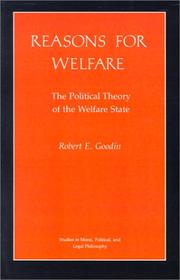| Listing 1 - 1 of 1 |
Sort by
|

ISBN: 0691077665 Year: 1988 Publisher: Princeton, NJ : Princeton University Press
Abstract | Keywords | Export | Availability | Bookmark
 Loading...
Loading...Choose an application
- Reference Manager
- EndNote
- RefWorks (Direct export to RefWorks)
Robert Goodin passionately and cogently defends the welfare state from current attacks by the New Right. But he contends that the welfare state finds false friends in those on the Old Left who would justify it as a hesitant first step toward some larger, ideally just form of society. Reasons for Welfare, in contrast, offers a defense of the minimal welfare state substantially independent of any such broader commitments, and at the same time better able to withstand challenges from the New Right's moralistic political economy. This defense of the existence of the welfare state is discussed, flanked by criticism of Old Left and New Right arguments that is both acute and devastating. In the author's view, the welfare state is best justified as a device for protecting needy--and hence vulnerable--members of society against the risk of exploitation by those possessing discretionary control over resources that they require. Its task is to protect the interests of those not in a position to protect themselves. Communitarian or egalitarian ideals may lead us to move beyond the welfare state as thus conceived and justified. Moving beyond it, however, does not invalidate the arguments for constantly maintaining at least the minimal protections necessary for vulnerable members of society.
Welfare state. --- Social justice. --- Bryan, William Jennings. --- Catholic Benevolent Fund. --- Gross National Product (GNF). --- Harrington, Michael. --- Heclo, Hugh. --- Joseph, Sir Keith. --- Keynesianism. --- Laffer curve. --- absolute needs. --- activist welfare state. --- adverse selection. --- air pollution. --- apartheid policies. --- bias and impartiality. --- capital distribution. --- clientelism in welfare. --- closet altruism. --- collective conscience. --- commercialization and services. --- conditional needs. --- contingent freedom. --- culture of poverty. --- defense contracts. --- disability insurance. --- duty of care concept. --- earnings, and labor supply. --- economic justice. --- entailed estates. --- extra-market allocation. --- farm relief. --- flagrant violation concept. --- formal discretion. --- fraternal organizations. --- generosity. --- gift relationship: altruism. --- humanism, and dependency. --- intentional discrimination. --- involuntary needs. --- laissez-faire. --- loss from exploitation. --- macroeconomics. --- mainstreaming. --- neighborhood schools. --- no choice standard. --- objective needs. --- obligations-based welfare. --- parenta. --- parole boards. --- personal deserts. --- positive discrimination. --- quality control. --- residential patterns.
| Listing 1 - 1 of 1 |
Sort by
|

 Search
Search Feedback
Feedback About UniCat
About UniCat  Help
Help News
News